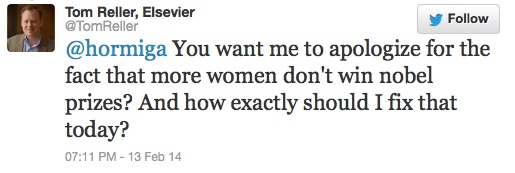My part of the Twitterverse is hopping this morning. First, the publisher Elsevier sent out a letter with a picture of a bunch of scientists, all of whom are white men. Pictures like that reinforce the stereotypes that keep young women away from science.
But as if that wasn’t enough, a spokesman from Elsevier went onto Twitter and made a cringeworthy mess of it all. Communications consultants: Take note!
The short version of the story goes like this: Brian O’Meara (@omearabrian) received a letter from Elsevier, took a picture of it, and posted the following tweet.
https://twitter.com/omearabrian/statuses/433998587068825601
Elsevier’s “head of corporate relations and company spokesman” first tried to write this off as being an “unintended oversight,” but quickly moved to a more aggressive defense.
@omearabrian Can question if that's a smart picture to use, but promoting nobels is quite common. We do a lot to promote more women in STEM
— Tom Reller (@TomReller) February 13, 2014
Not cringing yet? It gets worse. Elsevier uses a “bait and switch” technique, first asserting that the criticism really isn’t about their picture but about Nobel prizes, and then denying responsibility for the Nobel process.
https://twitter.com/TomReller/statuses/434042087239995392
[Update: Reller’s tweet was deleted so that link no longer works. The text, as written by Elsevier’s PR man Tom Reller, and still visible on the Huffington Post version of this article, reads: You want me to apologize for the fact that more women don’t win nobel prizes? And how exactly should I fix that today? The screen shot is as below.]

Here’s how you can fix it, Elsevier: Show leadership. Be bold. Make an impact. You could, for example, have written something like this in your letter.
We’d like to show you a picture of Nobel winners who have published with us because we’re proud that we bring some of the world’s most important research into the public arena. Unfortunately, when we looks at those pictures, they are all white men. We are not part of selecting Nobel prize winners. But we do care about science. At least half of the next generation of brilliant scientists will be women. We want to encourage them and we know from research on stereotypes that publishing a collage of the pictures of our Nobel winners will reinforce the view that science is a man’s domain. We don’t want to be part of that.
Elsevier does do work to promote women in STEM. What we learned today, though, is that promoting gender equality requires constant attention and awareness. Even those who work to promote it, when they forget, revert into “unintended” actions that are exactly the root of the problem.
We also learned how not to deal with mistakes. At least some of us did.
(Update: Several hours after posting this blog entry, Elsevier published a reply under the title Elsevier agrees with criticism about the lack of gender diversity in a recent email campaign.)
This post also appears at HuffingtonPost, under the title The communications guy bet the gender equality policy and lost.
Share
No Comments
3 Trackbacks
- What happens when under-qualified women apply for jobs? (And why Sheryl Sandberg and McKinsey wrongly think we don’t know.)
- What happens when under-qualified women apply for jobs? (And why Sheryl Sandberg and McKinsey wrongly think we don’t know.) | Curt Rice
- When is a shirt not just a shirt? | Belle Jar
Republish
I encourage you to republish this article online and in print, under the following conditions.
- You have to credit the author.
- If you’re republishing online, you must use our page view counter and link to its appearance here (included in the bottom of the HTML code), and include links from the story. In short, this means you should grab the html code below the post and use all of it.
- Unless otherwise noted, all my pieces here have a Creative Commons Attribution licence -- CC BY 4.0 -- and you must follow the (extremely minimal) conditions of that license.
- Keeping all this in mind, please take this work and spread it wherever it suits you to do so!

Discuss